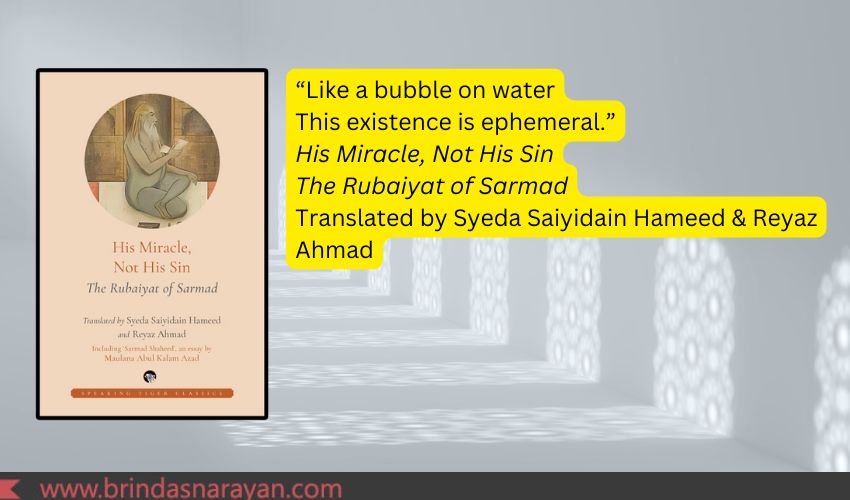
Sufi Mystics, Sacred Paths: Sarmad’s Enduring Legacy
Vedic Monism Meets Sufism
Sufism embodies mystical strands in Islam. When large numbers of Sufis swept into India in the 12th Century, their philosophy echoed the Vedic concept of “monism”. With “service to humanity” as their abiding ideal, their contribution to the nation is significant. Speaking in the language and dialects of common folk, they never attempted to convert anyone. Inclusive in their embrace of all people, they started gathering followers in the best way possible: organically.
Dara Shikoh’s Syncretic Legacy
Shah Jehan’s oldest son and designated successor, Dara Shikoh, was a poet and Sufi practitioner. He translated 52 Upanishads into Persian, wrote Majma-ul-Bahrain in Persian for Muslims and Samudra-Sangam in Sanskrit for Hindus. He tried to emphasize commonalities between both religions. He also translated the Bhagvad Gita and Yoga Vashishtha into Persian. These Persian translations spawned other European works, serving as cultural links between India and Europe. Unfortunately, Dara was executed by his brother Aurangzeb for exposing mullahs and maulvis who he considered hypocrites.
Love’s Transformative Power
Dara’s guide or teacher, Sarmad Kashani was accused and framed in a similar manner. Sarmad was an Iranian Jew from Armenia. Despite his Jewish origins, he had studied the Torah, Koran and Bible. And had early brushes with an Islamic philosopher and mystic. As Maulana Abul Kalam Azad, the first Minister of Education in Independent India, suggests in his essay on Sarmad, Islamic benedictions were available to all, as accessible as the sun’s rays are to plants in a garden: “Islam was all-embracing even like the love of God embraces all his creation.”
Landing in Thatta, Sind, as a trader, Sarmad became besotted with a young, soulful singer, Abhaichand. Sarmad became a mentor and perhaps lover of the boy, teaching him various religious texts, including Sufi ones. Such obsessive love, writes Azad, is critical for those who want to walk the spiritual path: “No one is worthy of being called human unless he has crossed the rubicon of love.” Love of another human being is a simulacrum of love of the divine:
“Once smitten it is easier to fall in love
Like the wick of the lamp
Once lit, is easier to light again.”
Love is one of those emotions that might cause you detach yourself from other worldly possessions. Later, when achieving an almost ecstatic state, he would strip himself naked, becoming thereon a naked fakir, who wandered to various places, including to Golconda in Hyderabad, and later to Delhi. When Shah Jehan heard of him, he was called to the palace. But he refused to heed the summons.
Dara Submits to Sarmad
Enchanted by the fakir, Dara Shikoh became his disciple or murid. Dara already had Sufi leanings, and used to say: “If you are with Muslims, say ‘Allah, Allah’, if with Brahmins, say ‘Ram, Ram’”. Dara even wore a stone with the word “Prabhu” imprinted on it. In his court, yogis, sanyasis and Muslim dervishes were accorded equal respect. Dara did not distinguish between temples and mosques. And he accepted Sarmad into his court, since he preferred to associate with the irrational, the love-intoxicated, the poets and fakirs rather than with rational plotters, intent on expanding kingdoms with violent conquests.
The Fakir’s Legendary Execution
Aurangzeb had all three brothers killed and his father imprisoned. Shaikh Sarmad remained. Aurangzeb had him investigated by a mullah, who suggested on confronting the fakir’s mischievous insouciance, he be awarded a death warrant. Despite pleas from his followers to relent, Sarmad happily acceded to the execution. Sarmad had always known he would be executed, predicting such an end in his verses.
When asked to recite the Kalima in court, Sarmad refused to proceed beyond the first two syllables: La Ilah. Legend has it that after his execution, his severed head sounded the remaining syllables: Illahlah.
As Azad writes, Sarmad was assassinated in the year in which Cooch Bihar and Assam were invaded. Historians of that period would not have predicted that those conquests would fade in the annals of history, but the Pir’s story would continue to fascinate.
Sarmad’s Poetic Yearnings
Sarmad wrote several rubayis or poems about Universal Love for the divine. This book contains seventy quatrains, translated into three languages: Urdu, Farsi and English. His poems, resonant then, serve as a critical reminder of our shared humanness in polarized times.
“One asks Allah for riches;
One asks Him for a beautiful companion;
I want neither this nor that,
Except union, I ask for nothing else.”
And
“A God-engrossed heart is splendid.
Beginning is good, end is good as well.
Worldly concerns are to be avoided.
Maintaining balance is the best.”
References
Syeda Saiyidain Hameed & Reyaz Ahmad, His Miracle, Not His Sin: The Rubaiyat of Sarmad, Speaking Tiger, 2024




